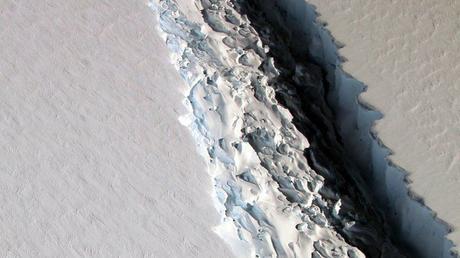 Back in December, I posted two articles (here and here) about a growing crack along the Larsen C Ice Shelf in Antarctica. At the time, the big news was that the giant rift had expanded to as much as 300 feet (91 meters) in width at some point, and it was growing at an alarming rate. So much so that scientists warned that the shelf would soon collapse, dropping an iceberg the size of Delaware into the ocean. At the time, we were in the middle of the Austral summer, so it was hypothesized that the colder temperatures of winter might slow the collapse down, but new reports indicate that that isn't the case, and the loss of this massive piece of ice now seems almost imminent.
Back in December, I posted two articles (here and here) about a growing crack along the Larsen C Ice Shelf in Antarctica. At the time, the big news was that the giant rift had expanded to as much as 300 feet (91 meters) in width at some point, and it was growing at an alarming rate. So much so that scientists warned that the shelf would soon collapse, dropping an iceberg the size of Delaware into the ocean. At the time, we were in the middle of the Austral summer, so it was hypothesized that the colder temperatures of winter might slow the collapse down, but new reports indicate that that isn't the case, and the loss of this massive piece of ice now seems almost imminent.According to researchers monitoring the crack on the Ice Shelf, the speed at which it is growing has only increased. Right now, in the dead of the Antarctic winter, it is now splitting apart at a speed of about 33 feet per day. It has also grown as wide at 1500 feet (457 meters) at some points as well. All of that evidence points to the shelf crumbling apart soon, although scientists aren't sure exactly when that will happen yet.
In a report published online yesterday, researchers at the U.K.'s Project MIDAS had this to say:
"The iceberg remains attached to the ice shelf, but its outer end is moving at the highest speed ever recorded on this ice shelf. We still can’t tell when calving will occur - it could be hours, days or weeks - but this is a notable departure from previous observations."They went on to add that when the collapse finally does occur, the Larsen Ice Shelf will lose 10% of its surface area. This will leave the ice in its "most retreated position ever recorded." And "this event will fundamentally change the landscape of the Antarctic Peninsula."
Worse yet, the glacier behind the ice shelf will now be more vulnerable to warming ocean temperatures as well. The shelf itself has served as a barrier from the seas, which will likely have a bigger impact on the ice moving forward. In other words, while this will be the largest iceberg ever seen, the impact on Antarctica is likely to be even more substantial.
As scary as this is in terms of climate change, I'd sure love to see some video of the collapse when it occurs. That is could be one cataclysmic event for sure. How this plays out moving forward will be interesting too.
Find out more here.

